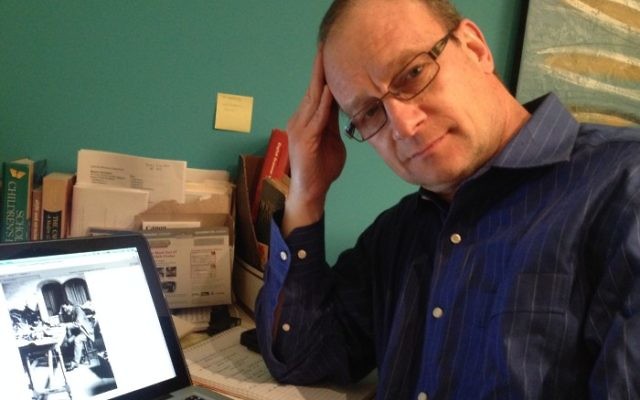The Necessity of Anti-Semitism Rallies
Like the COVID-19 virus, “the world’s oldest hate” mutates and may never totally disappear.
Dave Schechter is a veteran journalist whose career includes writing and producing reports from Israel and elsewhere in the Middle East.
We live in troubled times.
That’s what a local television reporter told the guest he was interviewing. I inferred from the reporter’s intonation that he was referring to more than the murder trial he was covering.
The United States is having a reckoning with its past. Americans are debating how to teach the nation’s racial history, while having a timely conversation about the role of race in the present day. Peoples and movements marginalized in the telling of the American story are demanding a more complete accounting, a prospect that has sparked a backlash from those either comfortable with established narratives or fearful about the consequences of a reassessment.
In the mythical “good old days,” life was easier and if we could just return to that halcyon time, everything would be better. I was born during one such decade and that misconception belies the reality that for many it was a time of struggle for equity of resources and equality of opportunity.
It is within the memory of some readers to recall when you might be refused an apartment lease or house purchase or denied a college education or a job because you were a Jew, though that might not have been the stated reason.
Today, the ease with which anti-Jewish sentiment is expressed — whether rising from the gutter or wafting from the windows of more refined quarters — demonstrates that, even in a period of progress and prosperity for American Jews, wariness is warranted.
A reckoning of another sort recently concluded in a Charlottesville, Virginia, courtroom, as a jury found organizers of the August 2017 “Unite the Right” rally liable under state law for injuries to counter-protesters and awarded damages in excess of $25 million. The jury deadlocked on two federal charges of conspiring to commit violence.
Khaki-wearing, tiki torch-carrying, neo-Nazis chanted “Jews will not replace us” as they marched through the University of Virginia campus. Armed men in camouflage stood outside Congregation Beth Israel as Shabbat services were held inside. “I had never seen extremism like that up close and I never feared for my safety as a Jewish person. It changed me,” Rabbi Rachel Schmelkin told Religion News Service.
The plaintiffs may never receive a penny, but the verdict sent a message that a bill can come due for public displays of hate.
A pair of events in Atlanta during Hanukkah, organized under a national “Shine A Light” banner, reminded those who knew and informed those less aware, that “the world’s oldest hate” requires constant vigilance.
Jew-hatred (a phrase some favor as more specific), has proven itself resistant to rallies, marches, and other forms of response. In their ignorance, anti-Semites will seize on some aspect of Jewish life or manufacture a grievance to justify their prejudice.
Rallies “make us feel that we are doing something to raise awareness about what’s going on,” I was told by someone who has attended his share.
An anti- anti-Semitism activist said: “Rallies aren’t going to stop anti-Semitism. For the most part a rally is preaching to the choir. It provides community and people don’t feel alone. It allows allies to come stand with you. It’s not going to change anyone’s mind. The only way to make change is one on one, meeting Jews when you hate Jews or don’t know Jews.”
Credit the organizers, they are doing what they can; while acknowledging, as one said, that “the real work has to take place on relationships” initiated at such events, particularly with people who have had little or no contact with the Jewish community.
Just about every day, I receive email and see social media posts from organizations seeking support for their campaigns to end anti-Semitism.
Perhaps, it was suggested to me, a more realistic goal would be to “disrupt rather than eradicate” this scourge (though that may be a less effective fundraising pitch).
Like the COVID-19 novel coronavirus, anti-Semitism mutates and maynever totally disappear. “We do everything that we can to minimize it as much as humanly possible,” a professional involved in that effort said.
Jewish Americans worship, observe, and celebrate their faith in the open, not hiding, while rejecting fear and expressing pride.
Yet, even as they demonstrate an admirable willingness to — literally and figuratively — let their menorahs shine in the front window, the fact anti-Semitism rallies are considered necessary attests to these being troubled times.
- From Where I Sit
- Opinion
- Dave Schechter
- COVID-19
- murder trial
- United States
- anti-Jewish
- American Jews
- Charlottesville Virginia
- Unite the Right
- Khaki-wearing
- tiki torch-carrying
- Neo-Nazis
- University of Virginia
- Congregation Beth Israel
- Shabbat services
- Rabbi Rachel Schmelkin
- Atlanta
- Hanukkah
- Shine A Light
- Rallies
- Anti-Semites
- Anti-Semitism
- jewish community
- Coronavirus
- Jewish Americans
- Menorahs




comments